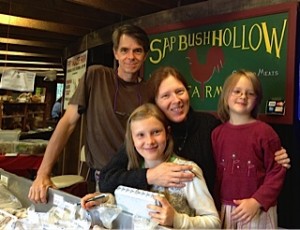Going through my archives in search of apropos essays for re-posting, this one came to the surface. As you can probably sense, it was written during one of my more cynical moments. I am certain many of you can help me revise and update this job description….I’ve yet to have anyone apply!
I am still working away at my new manuscript, and am anticipating a return to regularly scheduled programming by the end of May. Thanks for strolling through history with me as we revisit some of these archives!
Farm wife (or farm daughter) internship anyone?


By Shannon Hayes
June 3, 2008
“Farmers are the new rock stars.” That’s the word in the papers and on the street. Chefs slip us their business cards, customers bring their children to meet us. Reporters schedule interviews six weeks out. As our nation trembles under the burdens of climate change, credit card debt, home foreclosures and fuel costs, farmers are ‘the new cool.’ We exist in harmony with the earth, grow our own food, live within our means, don’t try to earn the big bucks, and we’re keeping the local economies alive. So the next generation digs us. Heck. They dig more than us. They dig our compost and our potatoes, too. After years of lamenting “there’s no good help anywhere,” bright, enthusiastic, hard-working twenty-somethings are breaking down our fences for a chance to learn to be a farmer. It’s a good thing, too. In a recent article, farmer and Food and Society Policy Fellow Zoe Bradbury reminded us that farmers comprise 1.6 percent of the U.S. population right now; and less than 6 percent of us are under the age of 35. We seriously need young folks to take an interest in our work.
Within weeks on our land, these kids are evaluating pasture, doing chores, building shelters, pounding fence posts, boning out pork butts and castrating livestock. They walk shoulder-to-shoulder with my dad in the fields, growing strong, confident and capable. Meanwhile, I, his daughter, after 30 years on the land, share few of their skills. I don’t know the chore routine by heart, I’m lousy with a hammer, its been ages since I’ve castrated anything.
Growing up, my brother was directed to feed the sheep after school. My job was to tend the chickens and wash the dishes from breakfast. On weekends, he helped trim hooves and de-worm the flock. I learned how to speed-clean. While I did a share of pitching manure, wrestling livestock and stringing fence, there was a definite division of labor along gender lines.
As a teenager, unsure whether I was too fragile or too incapable to do “the real farm work,” I directed my attention instead to learning to cook pork chops so they didn’t dry out. I took elderly farm neighbors to the grocery store and to their doctors’ appointments. I helped in their gardens, scavenged for wild blackberries, then stood in the kitchen to make jam.
Today we have as many female interns come to the farm as male. They work in harmony with my folks, all equals in strength and skill. I hold a share in the family business and invest many hours into its well-being, but I still don’t share the intern’s skills with the livestock. Should I call myself a farmer?
Perhaps the division of labor while growing up was an expression of the innocent sexism that existed within the old farm culture. Maybe it was a personal choice regarding how I contributed to the family. Either way, today I am not exactly a farmer. I prefer to think of myself as a Commanding Officer of Agrarian Domesticity (a.k.a. “farm wife”). And while the twenty-somethings are signing up for university sustainable agriculture courses and applying for internships to become farmers; I wonder how long it will take them to learn the skills they need not just to work the land, but to run a farm as a way of life. If farmers are the rock stars out in the fields, then we Commanding Officers are more like the drummers, base players, back-up vocalists, agents, and business managers. We keep the music going at a steady beat using a set of skills that are nearly obsolete in this culture. If anyone out there is interested in a Commanding Officer internship, below is a job description:
Job Title: Assistant to the Commanding Officer of Agrarian Domesticity
Description:
Gain valuable experience putting the “quality” into a quality of life. Learn to complete a series of daily tasks essential to maintaining your family farm as a home and business*:
- Review bank statements, medical, fuel and feed bills for accuracy; maintain precise paper trails when discrepancies must be disputed. Develop communication skills to argue effectively in person, on paper or over the phone. Learn to do so tactfully, because these folks might be neighbors, cousins, customers, or all of the above.
- Monitor the family budget and expenses, know where to stash money for a rainy day and how to negotiate with farmers to keep business expenditures in line.
- Identify socialization and learning opportunities for farm children or grandchildren that minimize expenditure of cash and gasoline. Protect non-farm playmates from typical agricultural hazards: protective sows, aggressive rams, guard dogs, watering holes, electric fences, rusty nails, etc.
- Cultivate relationships with benefactors of high-quality hand-me-down clothing.
- Befriend thrift shop operators; train them to identify and hold items you feel the family could use.
- Generate a hot meal using fresh, local and seasonal ingredients for the family, other farm interns, and any extra help that happens to be present. Be prepared to generate additional meals for individuals the farmer invites in at the last minute, including neighbors, friends, family members or customers who drop by at meal time. Afterward, clear the table, wash dishes, store food, identify creative ways to make use of leftovers. Repeat every four hours.
- Secure learning materials for school-age children or grandchildren, find time for instruction if home-schooled.
- Change diapers, do laundry, pay bills, check in on neighbors, particularly the elderly and infirm.
- Oversee family bath time, story time, and bedtime, then pick up any toys, wipe down the kitchen and bathroom, tidy the house.
- Maintain a feeling of serenity and welcome throughout the home and business at all times.
In addition to daily chores, the intern can participate in myriad seasonal and weekly activities including:
- sewing patches on Carhartts and refastening buttons on flannel shirts;
- bringing farm products to market;
- pickling, canning, freezing and lacto-fermenting enough fruits and vegetables to last through the winter;
- rendering animal fats for lard and tallow; making soaps;
- identifying other farmers with whom to barter for essential items not produced on-farm;
- coordinating trips to town for supplies to minimize fuel costs;
- weeding the vegetable patch;
- nurturing new customers and seeking new markets;
- stepping in to assist in any duties the farmer may need help accomplishing; such as setting up the brooder, killing chickens, mowing hay, loading cattle, and on occasion, performing castrations.
Hours are flexible. Typical work days are about 16-18 hours, seven days per week, you decide which hours to work. Only 12-14 hours required on Sundays. Come be a part of something great. This is work you will truly love. With more folks like you, we can generate great food, live within our means, create vibrant communities, raise joyful children, enjoy happy marriages, heal the planet and build a secure, sustainable future. Without you, the beat can’t go on. All applications will be accepted on an ongoing basis.
* Once you’ve mastered the above skills, please be sure and teach me.
This post was written by Shannon Hayes, whose blog, RadicalHomemakers.com and GrassfedCooking.com, is supported by the sale of her books, farm products and handcrafts. If you like the writing and want to support this creative work, please consider visiting the blog’s farm and book store.
To view Ula’s Greeting Cards and support Saoirse and Ula’s (Shannon and Bob’s kids) entrepreneurial ventures, click here.
Feel free to click on any of the links below to learn about Shannon’s other book titles:




Do you think this has changed much in six years? Maybe adding skills such as new updated computer systems, colored canning jars and silicone utensils. The key word, happy, still stands out. I would not have missed one day of these past six years with all its changes.
Dear Shannon,
I will be glad when you are back in May also. I’ve realized that your blog is the most meaningful and encouraging to me. However, for now I also really like your reposts too. I am glad that you emphasized that being a “Farm Wife” is just as difficult and demanding as being a farmer and that this role helps hold everything together. It is nice to see when someone appreciates this for what it really is worth. Thank you for the excellent writing.
I find these kinds of jobs/roles in a family, both on the farm and in the city are hard for others to recognize as such. I’m not a farm wife but my husband and I are both self employed artists, craftspersons. My husband currently cares for a community water play park during the summer. We live and work in the downtown of a medium sized city and have a studio, subcontractors and a growing vegie garden to supplement the organic diet we choose.
Our kids are grown but one daughter and two granddaughters live in town. My son and his wife are in our garage apartment and we all try to live sustainably, sharing tools, work and knowledge, avoiding waste, while eating locally and healthfully. Just a bunch of “radical homemakers.” We are old hippies who believed we should follow our hearts even if that meant making less money and having to be more resourceful. My son is very proud of the lifestyle he grew up in and all the skills he developed from childhood.
I think the above paragraphs say it all. The skillset you describe above would be needed other types of families including ours inside a city. Often in partnerships, one partner finds it easiest to tackle the big tasks, no matter how complex or strenuous or overwhelming as long as it is a complete job with a beginning and end. Take recycle out. Dig up a bunch of dirt. Fix the car. Make two worm bins. Replace a toilet. Take out a tree. Write a song. Put together a band. Research used computers to find the best fit for the money. Even cook a roast or pot of chilli.
And one person in any partnership, business or otherwise fills in all the rest like the concrete between bricks or the yogurt in the granola. This role takes the ability to keep one thing in mind while breaking from one task to quickly address another problem and then remembering where you were. One must be responsive and flexible. Schedules are there for changing and rearranging. Problem solving is continuous, fun and energy demanding. And the variety of skills and amount of knowledge and continual learning necessary are mind blowing.
The weird part is that this kind of role is like the atmosphere, hard to see and just as important. I have this role in my family and though there are probably many who could do a better job of it, I find I am happy with the challenge. I certainly respect and admire those who excell! They are my heroes and my role models. I am older and these skills are getting harder to manage but the amount of knowlege and experience I have accumulated have changed my role to teacher which I love most of all. I guess we who choose to take on this most important of roles can feel some contentment knowing that all of us doing this kind of invisible work notice it, see it, know it, repect it and appreciate it when we see it. Our own mutual admiration society.
You keep me thinking and wondering dear Shannon. Thanks so much for all you do and share.
Where do I sign up? I have some of these skills, but could definitely improve. Keep me in mind when you need a new intern.